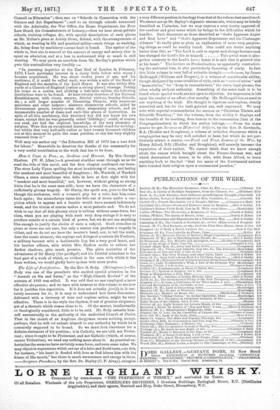Assault on Sin and Satan," as the "High-Church Revival" of
the autumn of 1869 was called. It was said that no one employed a more -effective eloquence ; and we turn with interest to this volume to see how tar it justifies this reputation. If it does not actually justify it, it cer- tainly accounts for it; it is easy to understand how these discourses, • or theologically considered, little is to be said. Mr. Body submits him- self unreservedly to the authority of the undivided Church of Christ. That in the month of an Anglican clergyman means nothing, except, perhaps, that he will not submit himself to any authority by which he is sommonly supposed to be bound. So we must look elsewhere for a definite statement of his position ; it is Catholic, we are told, not Protes- tant; since it ought to be Protestant, and not Catholic (which, of course, means Tridentine), we need say nothing more about it. As practical ex- hortation the sermons have certainly some force, and even some value. We may object to expressions whichsavour of a false and florid taste,—to this, for instance, "his heart is flooded with love as God kisses him with the kisses of His month," but there is much earnestness and energy in them. —Scripture Paradoxes, by the Rev. Dr. Bayley (0. P. Alvay), occupies a very different position in theology from that of the volume last mentioned. We cannot accept Dr. Bayley's dogmatic statements, which may be briefly described as Unitarian, but we may express a very hearty approval qf the candour and good sense which he brings to the difficulties which he handles. Such discourses as those described as "God's Apparent Anger and Real Love" and "God's Apparent Repentance and his Unchange- ableness " do really give as plain an explanation of some very perplex- ing things as could be readily found. One could not desire anything better than this, as "The Lord is said to repent and change because man has changed the Lord's life in himself This awful state is alto- gether contrary to the Lord's love ; hence it is said that it grieved him at his heart." The lecture on Predestination, as apparently contradict- ing the universal love, is also particularly deserving of study. In fact this little volume is very full of valuable thought. —Sermons, by ,Tames McDougall (Williams and Norgate), is a volume of considerable ability, though disfigured by some crudities of style, such as "rectoral action" and "memorialize," for "keep in remembrance," the one's legal phrase, the other wholly without authority. Something of the same fault is to be found where special words are not open to objection. An impression is left upon the reader of an effort after novelty. Mr. McDougall has no need to use anything of the kind. His thought is vigorous and copious, clearly conceived and, but for the fault pointed out, well expressed. We may note with especial commendation the sermon on "Christian Theism and Scientific Teaching ;" but the volume, from the ability it displays and the breadth of its teaching, does honour to the communion (that of the Congregationalists) to which the author belongs.—From the same source we get Sermons on Historical Subjects, by the Rev. D. Rowlands, B.A. (Hodder and Stoughton), a volume of orthodox discourses which a congregation may be very well satisfied to hear, but which do not par- ticularly attract a reader. —Truth and Trust, Lessons of the War, by Henry Alford, D.D. (Hodder and Stoughton), will scarcely increase the reputation of their author. We cannot think that we know enough about the causes which brought about the Franco-German war, and which determined its issues, to be able, with Dean Alford, to trace anything back to the fact "that too many of the Continental nations have founded their religion upon a sacramental paradox."


































 Previous page
Previous page